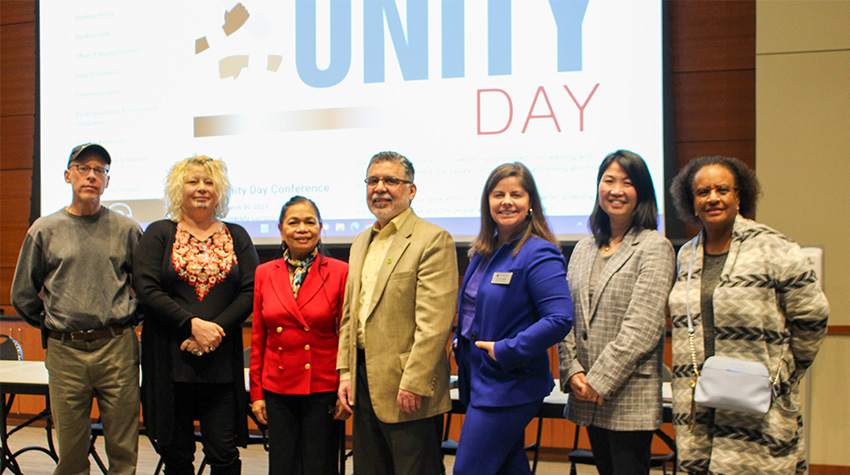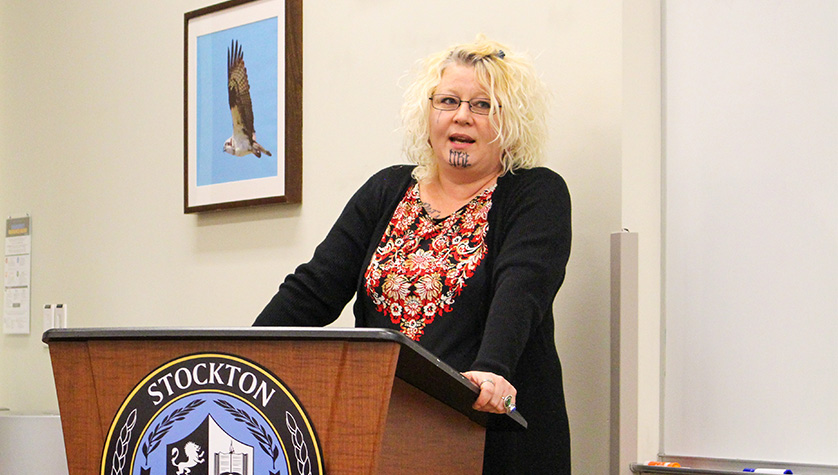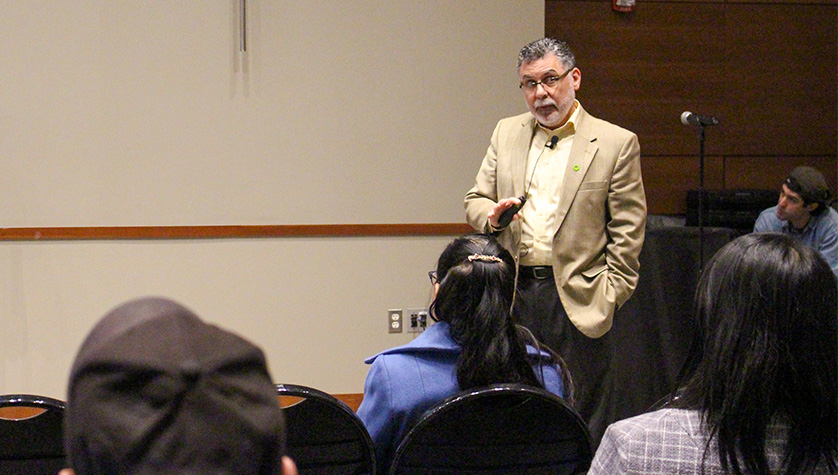Unity Day Focuses on Leadership, Decolonization and Studying Abroad
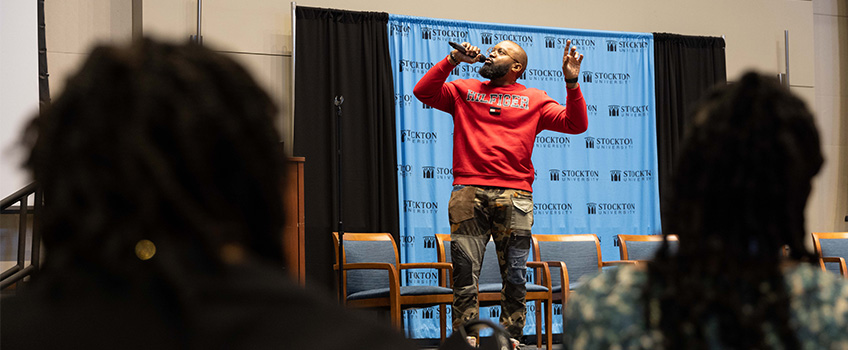
Passport Rav giving a musical performance during Unity Day's Lunch and Learn panel discussion. Photo by Susan Allen.
Galloway, N.J. — The Social Justice & Education subcommittee of the Committee on Campus Diversity and Inclusion Excellence (CCDIE) hosted their annual Unity Day conference on Thursday, March 30.
The theme for this year’s event was “Unity in Global Education,” and topics included promoting solutions to social issues, exploring strategies for promoting global education, and interrogating colonization through exploring decolonization.
“Stockton’s Unity Day celebration is an impetus for how we move forward and how we think about unity,” said Guia Calicdan-Apostle, an associate professor of Social Work. “As a co-convener for CCDIE and convener of the Social Justice & Education subcommittee, I’m passionate about unity. The world is in chaos all of the time, so today is the day when we can be actively connected with each other as human beings. All of this is intentional.”
Virtual and In Person Presentations
In her virtual presentation, “Strategies for Shifting Mindsets for Readiness in Global Transformational Change,” Sequetta Sweet, assistant professor of Organizational Leadership, talked about understanding diversity, equity and inclusion (DEI), social change, and how that work requires “a change in each of us individually to reach the collective.”
When discussing transformational change, she pointed to understanding schemas or the mental models that drive our behaviors, thoughts and actions. She said examining one’s schema can lead to unlearning both behaviors and constraints on behaviors.
“Changing deeply held beliefs means fundamentally changing our reality or the way we see reality is an extremely involved process,” Sweet said. “It’s not easy to change, but getting to the very heart of why you think the way that you think is important.”
Other topics of her session included leadership development as a strategy for change; the importance of questioning and challenging one’s beliefs, assumptions, values, and thinking that underpins one’s actions; individual unlearning as part of the process of change; critical reflection as a change readiness strategy, and leadership styles as a mechanism that supports change.
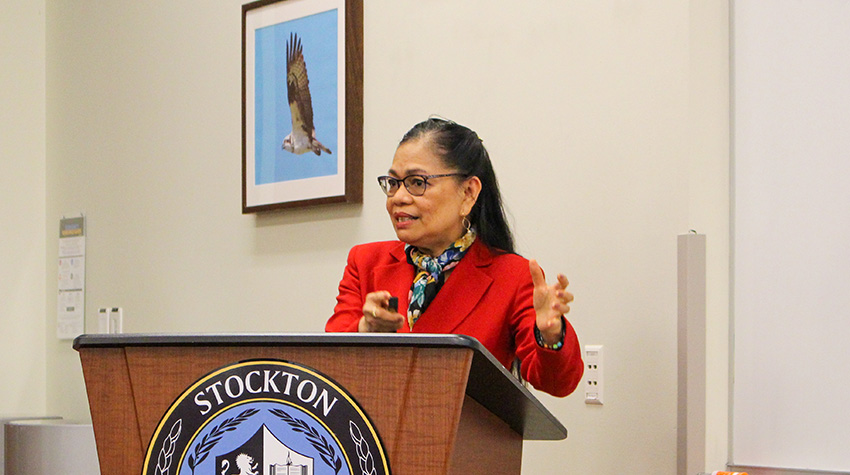
After acknowledging that her in-person presentation was taking place on Lenni-Lenape land, Calicdan-Apostle presented “Working Toward Decolonization and Reconstruction in Higher Education: Small Steps or Giant Leap?”
In her presentation, she defined decolonization as “a process of deconstructing colonial ideologies of the superiority and privilege of Western thought and approaches through collective action.” In other words, decolonization is the practice of calling out settler-colonialist thinking and actions and therefore dismantling them through careful examination and reclaiming lost Indigenous practices.
“So, what does it means to decolonize education?” Calicdan-Apostle asked the audience. “Well, we need to examine the limitations and biases of the curriculum. Yes, the curriculum is set, but is there any input coming from Indigenous peoples? How are we examining the political and societal legacies of colonialism and how it has influenced educational policies?”
To connect the concepts of decolonization and global education, Calicdan-Apostle used a quote by Nelson Mandela, anti-apartheid activist and former president of South Africa.
“’Education is the most powerful weapon that you can use to change the world,’” Calicdan-Apostle said. “Our theme today is ‘Unity in Global Education,’ so decolonizing higher education is important. Indigenous people come from north, south, east and west of the world, and yet, they have little to no voice in designing education.”
Lunch & Learn Panel Discussion
Following a talk and musical performance from Passport Rav, a panel of faculty, staff and students offered perspectives on studying abroad.
“I was always interested in learning about languages, cultures and exploring different countries,” Math and Computer Science double-major Riya Goyal said. Goyal is an international student from India who has participated in studying abroad in Taiwan from Stockton. “I really like hearing different points of view and meeting different people in the world.”
“I was welcomed as if I was family: I felt at home,” Kimoni Yaw Ajani, assistant professor of Africana Studies said about his trip to Benin and staying at a Black-owned hostel. “I didn’t have to worry about the police. I wasn’t eating fast food every day and was instead eating from the land and the people. The energy was different, and I felt that I underwent a transformation. From that moment on, I knew I was an African person and that I had a connection to other African and Black people across the globe.”
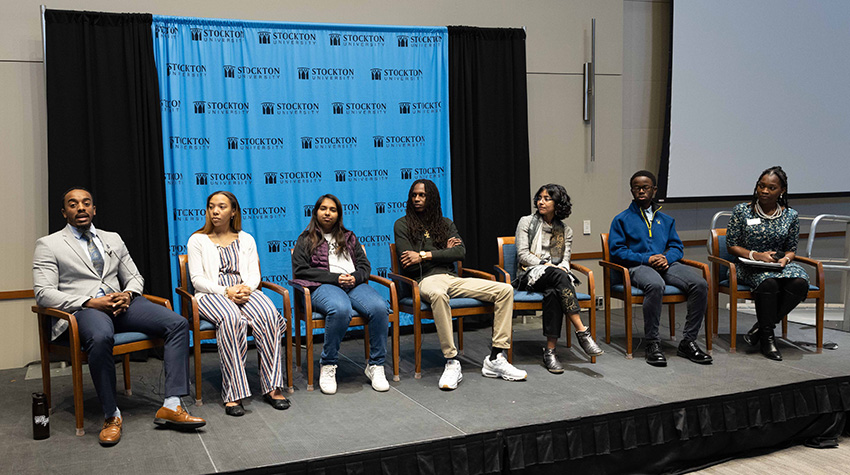
(L-R): Haashim Smith-Johnson ‘19, Admissions recruiter; Tamara Farrow ‘22 Business, current MBA student; Riya Goyal, undergraduate Mathematics & Computer Science majors; Kimoni Yaw Ajani, assistant professor of Africana Studies; Ramya Vijaya, professor of Economics; Ian Adjangba, undergraduate Finance major and Shedia Laguer, associate director of Student Development. Photo by Susan Allen.
“The entire trip was me learning my own culture,” Haashim Smith-Johnson, Admissions recruiter, said, sharing how much he learned in South Africa. “It’s very common for Black Americans to not know their ancestral roots: I don’t know if I’m from Nigeria, Ghana, or any of the other countries, so going to South Africa and visiting the motherland as a whole was a win for me. It was very fulfilling. I got to see many of the different arts, music and dances there, and a lot of them were very similar to the Black American culture here.”
“Going to other countries as a Fulbright scholar is a unique situation as you are going there as a representative of the (United States), and their expectation of a representative was very different from me,” Ramya Vijaya, professor of Economics, said, describing her experience in Sri Lanka. “You do feel a sense of letting people down, but you should own it instead: it’s okay to say that and to use your privilege as a visiting American student to talk about it, question it and educate others.”
Finance major Ian Adjangba and MBA student Tamara Farrow both studied in Ghana and shared some advice for students who are interested in following in their footsteps.
“I would definitely say to look at the pop culture of (where you’re visiting),” Adjangba said. “Both of my parents are from Ghana, but I’d never been there outside of when I visited as an infant. I learned how entrepreneurial Ghanaians were once I got there —– people were selling wristbands with your name on them in the street.”
“It’s an experience that you can only experience for yourself,” Farrow said. “Like, I can tell you that Ghana is great and that you should go or show you photos and videos of how excited I was when I was there, but you have to live in that experience yourself.”
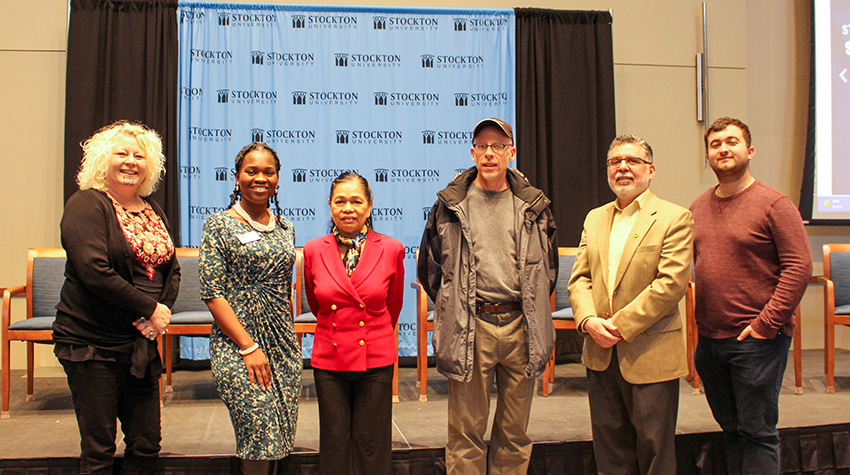
Calicdan-Apostle encouraged the Stockton community to think about the “oneness of humanity,” despite the negativity happening in the world.
“We are surrounded by negativity and all of the things that are contrary to our sensibilities as human beings,” Calicdan-Apostle said. “When people talk about weapons of mass destruction and war, we should think about peace, unity and our commonalities with other people in the world. That is why I’m here!”
Guest Speakers
- Yolanda C. Padilla, University of Texas
- Sophia Emmanouilidou, Aristotle University of Thessaloniki
- Victoria Parker, Purdue University
- Thomas Mantzaris, Aristotle University of Thessaloniki
- Tina Zappile and Jiangyuan "JY" Zhou, Stockton University
- Dani Cranmer, Urban Indigenous Collective
- Al Morales, Climate Reality, Inc.
About the CCDIE
The Committee on Campus Diversity and Inclusion Excellence (CCDIE) serves as an advisory body to the President to assist the university in meeting its commitment to campus diversity and inclusive excellence and the continuing transformation from a campus that believes in diversity to a campus that lives its commitment to diversity.
The CCDIE includes faculty, staff, students and alumni who contribute to the University’s efforts to support and further campus diversity, equity, inclusion and social justice, as well as the University’s mission to develop engaged and effective citizens with the capacity to adapt to change in a multicultural, interdependent world.
The Social Justice & Education Subcommittee of the CCDIE organizes programs, panel discussions, and research presentations by collaborating with faculty, students, and others whose academic fields or research interests address issues related to diversity and inclusion, whether national or global, in focus.
Members of Social Justice & Education Subcommittee
- Valerie Hayes, Chief Officer for Diversity and Inclusion
- Guia Calicdan-Apostle, Associate Professor of Social Work
- Shedia R. Laguer, Assistant Director of Student Development
- JY Zhou, Director Office of Global Engagement & Senior International Officer
- Christopher Lipari-Pazienza, Engage NJ Changebuilder VISTA
- Dianne Stalling, Assistant Director, Student Development
- Loukaia Taylor, Communications Specialist
- Julie Shockley, Professional Services Specialist 3, Facilities & Operations
– Story by Loukaia Taylor
– Photos by Loukaia Taylor and Susan Allen
